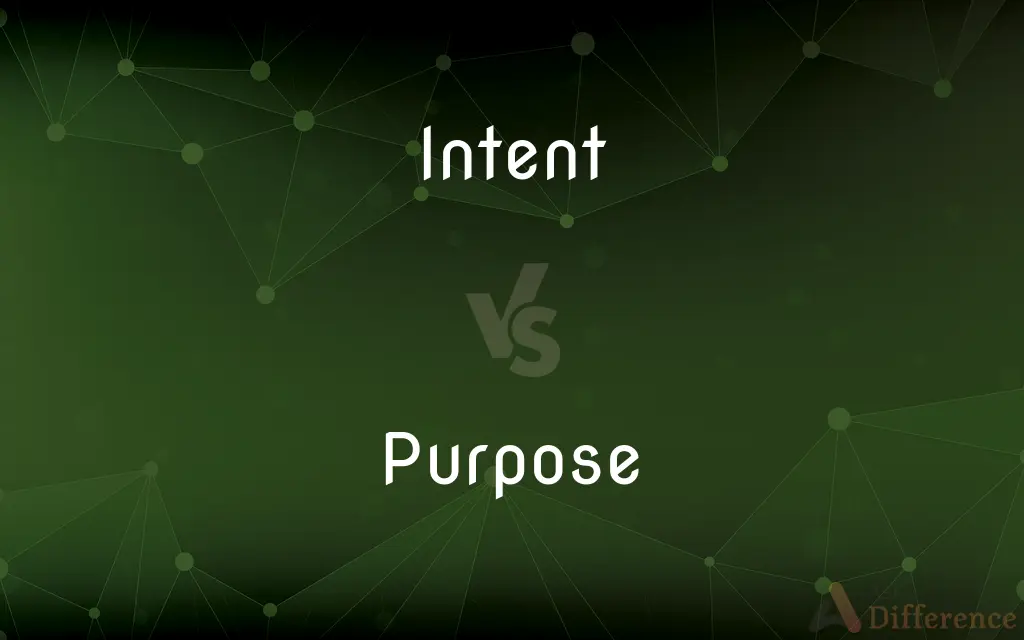Intent vs. Purpose — What's the Difference?
Edited by Tayyaba Rehman — By Fiza Rafique — Updated on October 30, 2023
Intent refers to a person's resolved plan or aim, while Purpose signifies the reason or motivation behind an action or existence.

Difference Between Intent and Purpose
Table of Contents
ADVERTISEMENT
Key Differences
Intent and Purpose, while sometimes used interchangeably, have nuanced distinctions. Intent is typically associated with a mindset, reflecting a person's specific aim or plan. When someone talks about their intent, they're indicating their mental determination or resolve towards a specific outcome. On the other hand, Purpose embodies the overarching reason or rationale for something, often answering the question "why?"
While Intent often outlines the "what" in someone's plan, Purpose reveals the underlying "why" behind that action. For example, a student's intent may be to study hard, showcasing the specific action they're set on taking. However, their purpose might be to gain knowledge, providing the broader reasoning behind their intent to study.
Purpose can also align with a larger, often more abstract, goal, whereas Intent usually emphasizes a clear and direct aim. For example, a company's purpose may be to better the world through sustainable products. Their intent, in contrast, could be launching a specific eco-friendly product next month.
To further differentiate, consider a sculptor. Their intent might be to chisel a statue from a block of marble. But their purpose, the deeper motivation, might be to convey a message or emotion through their art.
Comparison Chart
Definition
A resolved plan or aim
The reason or motivation behind an action
ADVERTISEMENT
Part of Speech
Noun
Noun
Scope
More specific
Broader, overarching
Emphasis
Reflects determination or resolve
Answers the "why" behind actions or things
Common Usage
Indicates a specific plan or action
Indicates a broader rationale or motivation
Compare with Definitions
Intent
Intent can also mean the act of turning the mind to something.
His intent gaze made her nervous.
Purpose
Purpose refers to an intended or desired result.
He achieved his purpose of becoming a pilot.
Intent
Intent refers to the mindset with which something is done.
The letter was written with a positive intent.
Purpose
Purpose denotes a particular requirement or consideration.
This tool has a special purpose in the workshop.
Intent
Something that is intended; an aim or purpose.
Purpose
Purpose signifies a person's determination or resolve.
She went to the city with a clear purpose in mind.
Intent
(Law) The state of mind necessary for an act to constitute a crime.
Purpose
Purpose means the reason for which something exists or is done.
The purpose of the meeting is to discuss future strategies.
Intent
Firmly fixed; concentrated
An intent gaze.
Purpose
The object toward which one strives or for which something exists; an aim or goal
Her purpose in coming here is to talk to you. The purpose of an airliner is to transport people.
Intent
Having the attention applied; engrossed
The students, intent upon their books, did not hear me enter the room.
Purpose
Determination; resolution
He was a man of purpose.
Intent
Having the mind and will focused on a specific purpose
Was intent on leaving within the hour.
Are intent upon being recognized.
Purpose
To intend or resolve
"the gap between what is said and what is purposed" (Ian Donaldson).
Intent
Something that is intended.
Purpose
The end for which something is done, is made or exists.
What is the purpose of your visit?
My purpose in coming to Egypt was simply to take it en route to the desert.
It has been my purpose to illustrate rather than to explain.
The exceptionally small gate-leg table served the purpose of a tea table admirably.
The purpose of the device is to prevent the breechblock from opening accidentally should the gun be held barrel down.
The purpose of this letter is to set the record straight.
The purpose of this book is to study the interrelationship of government and religion.
The device can be used for both civilian and military purposes.
The purpose of turning off the lights overnight is to save energy.
Intent
(legal) The state of someone’s mind at the time of committing an offence.
Purpose
Function, role.
Intent
Firmly fixed or concentrated on something.
A mind intent on self-improvement
Purpose
(Sense of having a) meaning for existing or doing something.
Intent
Engrossed.
Purpose
Resolution; determination.
Intent
Unwavering from a course of action.
Purpose
(obsolete) The subject of discourse; the point at issue.
Intent
Closely directed; strictly attentive; bent; - said of the mind, thoughts, etc.; as, a mind intent on self-improvement.
Purpose
(transitive) To have or set as one's purpose or aim; resolve to accomplish; intend; plan.
Intent
Having the mind closely directed to or bent on an object; sedulous; eager in pursuit of an object; - formerly with to, but now with on; as, intent on business or pleasure.
Be intent and solicitous to take up the meaning of the speaker.
Purpose
(intransitive) To have (an) intention, purpose, or design; to intend; to mean.
Intent
The act of turning the mind toward an object; hence, a design; a purpose; intention; meaning; drift; aim.
Be thy intents wicked or charitable.
The principal intent of Scripture is to deliver the laws of duties supernatural.
Purpose
To discourse.
Intent
An anticipated outcome that is intended or that guides your planned actions;
His intent was to provide a new translation
Good intentions are not enough
It was created with the conscious aim of answering immediate needs
He made no secret of his designs
Purpose
That which a person sets before himself as an object to be reached or accomplished; the end or aim to which the view is directed in any plan, measure, or exertion; view; aim; design; intention; plan.
He will his firste purpos modify.
As my eternal purpose hath decreed.
The flighty purpose never is o'ertookUnless the deed go with it.
Intent
The intended meaning of a communication
Purpose
Proposal to another; discourse.
Intent
Directed with intense concentration;
A fixed stare
An intent gaze
Purpose
Instance; example.
Intent
Wholly absorbed as in thought;
Deep in thought
That engrossed look or rapt delight
The book had her totally engrossed
Enwrapped in dreams
So intent on this fantastic...narrative that she hardly stirred
Rapt with wonder
Wrapped in thought
Purpose
To set forth; to bring forward.
Intent
Intent means a determined plan or design.
Her intent was to finish the project by Friday.
Purpose
To propose, as an aim, to one's self; to determine upon, as some end or object to be accomplished; to intend; to design; to resolve; - often followed by an infinitive or dependent clause.
Did nothing purpose against the state.
I purpose to write the history of England from the accession of King James the Second down to a time which is within the memory of men still living.
Intent
Intent signifies a person's purpose or objective.
The intent behind his actions was to help, not hinder.
Purpose
To have a purpose or intention; to discourse.
Intent
Intent denotes a clear and focused aim.
The athlete trained with the intent of winning gold.
Purpose
An anticipated outcome that is intended or that guides your planned actions;
His intent was to provide a new translation
Good intentions are not enough
It was created with the conscious aim of answering immediate needs
He made no secret of his designs
Purpose
What something is used for;
The function of an auger is to bore holes
Ballet is beautiful but what use is it?
Purpose
The quality of being determined to do or achieve something;
His determination showed in his every movement
He is a man of purpose
Purpose
Propose or intend;
I aim to arrive at noon
Purpose
Reach a decision;
He resolved never to drink again
Purpose
Purpose can also mean the subject in hand or the point at issue.
We should return to our original purpose of discussion.
Common Curiosities
Is Purpose always about a larger goal?
While purpose often aligns with a broader goal, it can also refer to specific intended results.
Is intent always conscious?
Typically, intent is conscious as it reflects a determined plan or aim, though subconscious intentions can exist.
Is Intent more specific than Purpose?
Generally, intent is more specific, indicating a particular plan, while purpose is broader, revealing the reason behind it.
Are Intent and Purpose synonyms?
While they have similar meanings and can sometimes be used interchangeably, they are not exact synonyms and carry nuanced differences.
Can a person's intent differ from their purpose?
Yes, one's intent (specific plan) might differ from their overarching purpose (reason behind the plan).
Can intent change over time?
Yes, as circumstances and perspectives change, one's intent can also evolve.
Can a single action have multiple purposes?
Yes, an action can serve multiple purposes or achieve various objectives.
Does intent always imply action?
No, intent can be a mere mental determination without actual follow-through.
Can Purpose be inherent to objects?
Yes, objects can have a purpose, like a knife's purpose is to cut.
Is a purpose always positive?
No, purposes can be positive, negative, or neutral, depending on the context and perspective.
Can you measure intent?
While intent is a mental state and not directly measurable, its effects or outcomes can sometimes be observed and measured.
Are intent and purpose dependent on each other?
While they can be related, they are independent concepts. One can exist without the other.
Can you have a purpose without clear intent?
Yes, one might have a general purpose (e.g., to be happy) without a specific intent on how to achieve it.
Does every action need a purpose?
Not necessarily. Some actions might be habitual or done without a clear purpose.
Can a company's purpose differ from its intent?
Yes, a company's overarching purpose (e.g., bettering the world) might differ from specific intents (e.g., launching a new product).
Share Your Discovery

Previous Comparison
Who vs. Whom
Next Comparison
Crazy vs. WildAuthor Spotlight
Written by
Fiza RafiqueFiza Rafique is a skilled content writer at AskDifference.com, where she meticulously refines and enhances written pieces. Drawing from her vast editorial expertise, Fiza ensures clarity, accuracy, and precision in every article. Passionate about language, she continually seeks to elevate the quality of content for readers worldwide.
Edited by
Tayyaba RehmanTayyaba Rehman is a distinguished writer, currently serving as a primary contributor to askdifference.com. As a researcher in semantics and etymology, Tayyaba's passion for the complexity of languages and their distinctions has found a perfect home on the platform. Tayyaba delves into the intricacies of language, distinguishing between commonly confused words and phrases, thereby providing clarity for readers worldwide.
















































